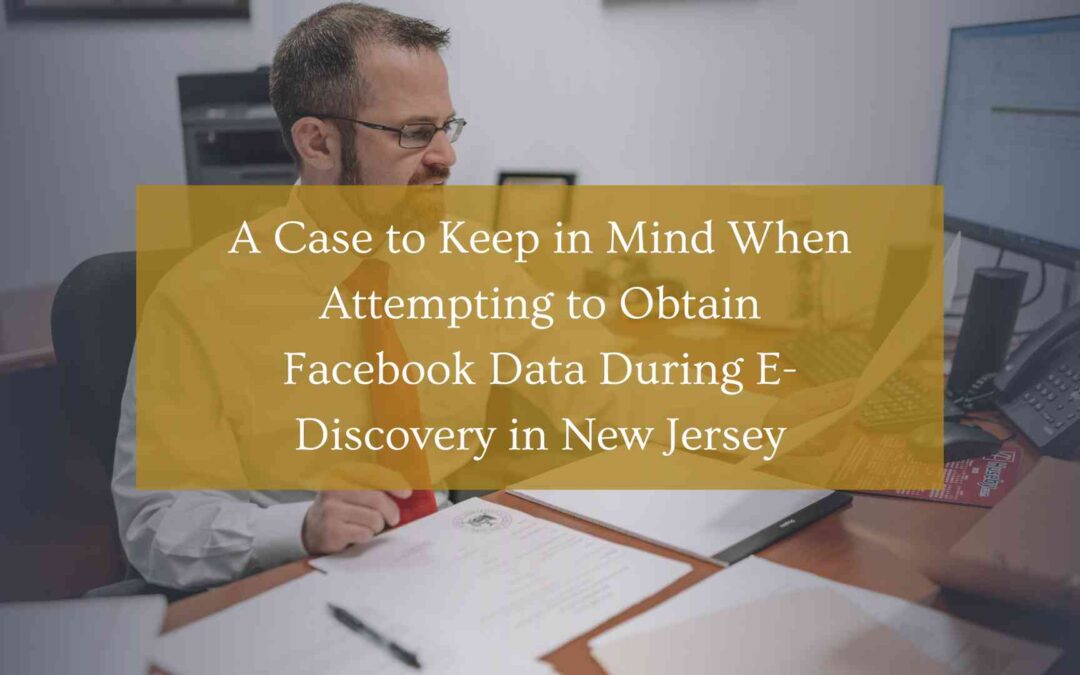The case of Gatto v. United Airlines offers some instructive insights into the process of obtaining Facebook data for court cases in the state of New Jersey. Specifically, the case demonstrates the risk of permanent loss of information that is not properly safeguarded during the e-discovery process. Even with a valid subpoena and legally mandated access to social media sites, the defendants in Gatto v. United Airlines were unable to obtain the evidence they sought from the plaintiff’s Facebook account. The judge in the case determined that Gatto had intentionally deleted the account and instructed the jury to take this into consideration when making their determination.
Basics of the Case
This case began when Frank Gatto, a baggage handler and ground operations supervisor for JetBlue Airways corporation, was injured during the course of his duties at John F. Kennedy International Airport. Gatto was unloading baggage for an aircraft operated by United Airlines when fueler stairs in use by Allied Aviation Services struck Gatto and caused serious injuries to him. The incident occurred in January 2008. Gatto was permanently disabled as a result of his injuries. He sought compensation from United Airlines and from Allied Aviation Services through a lawsuit against these companies.
Social Media Accounts
As part of the e-discovery process, the attorneys for the defense requested access to all social media and online accounts owned or controlled by Gatto. They received permissions and authorizations for all accounts except Gatto’s Facebook page. The intent of these requests was to verify the extent of Gatto’s injuries and their impact on his everyday activities. In the early part of December 2011, the defense prevailed upon Gatto’s attorneys to obtain access to the Facebook account. The password to the account was changed to a shared password and the defense attorneys began the process of accessing the Facebook account shortly after this agreement was reached.
Deactivation of the Facebook Account
On December 16, 2011, Gatto deactivated his Facebook account because of alerts sent by the social media site that his account was being accessed from unfamiliar IP addresses. According to Gatto, he had been hacked in the past and deactivated his account in an effort to prevent this from happening again. The defense team had not yet completed their evaluation and download of materials on Gatto’s Facebook page. When they determined that the page had been deactivated, the defense requested access directly from Facebook to the materials in Gatto’s account. Unfortunately, these materials had already been deleted in accordance with Facebook’s policy of removing accounts 14 days after deactivation.
Issuing an Adverse Inference Instruction
Although Gatto claimed that his actions were not intended to deprive the defense of their opportunity to review the contents of his Facebook account, U.S. Magistrate Judge Steven C. Mannion found that sanctions were justified against the plaintiff in the case. An adverse inference instruction, which is sometimes referred to as a spoliation instruction, was merited on the following four grounds:
• Gatto was in control of the contents of his Facebook account.
• Gatto was responsible for the destruction of the data in his Facebook account.
• The evidence was relevant to the case and might have been useful to the opposing parties in the case.
• Gatto could have foreseen that the information in the Facebook account would be requested by opposing counsel in relation to his case.
The adverse inference instruction allows jury members to assume that the failure to produce a document amounts to evidence that the document’s contents may be harmful to the case of the party in question.
An Instructive Outcome
Judge Mannion did not uphold the request of the defense for monetary sanctions against the plaintiff in Gatto v. United Airlines, noting that there was no likely malice in the actions of the plaintiff. However, the court did find that Gatto had removed the ability of the defense counsel to access relevant information and that an adverse inference sanction was appropriate.
Working with a qualified and knowledgeable New Jersey law firm is a solid step toward resolving issues with e-discovery and presenting the most aggressive defense for your case. At the Di Lauri & Hewitt Law Group, we have the experienced litigation attorneys you need to resolve your case quickly and in the most practical way possible. Call us today at 973-354-5783 to schedule a consultation with us. We look forward to the opportunity to serve you.
Get in touch with us
How Can
Our Lawyers
Help You?
We understand how important it is for our clients to get the legal help they need today. We are here for you and ready to help.
Why Trust Us?
Rated by Super Lawyers
As a Rising Star personal injury attorney in Morristown, New Jersey for multiple years in a row.
No aspect of this advertisement has been approved by the Supreme Court of New Jersey.
National & Local Proficiency
We have litigated in every vicinage (court) in New Jersey and we deliver an exceptional breadth and depth of experience in representing corporations, businesses, families, and individuals in need of legal advisors to protect their rights.
20+ Years of Combined Experience
We have a track record of success that spans over two decades in getting you the results you deserve.

